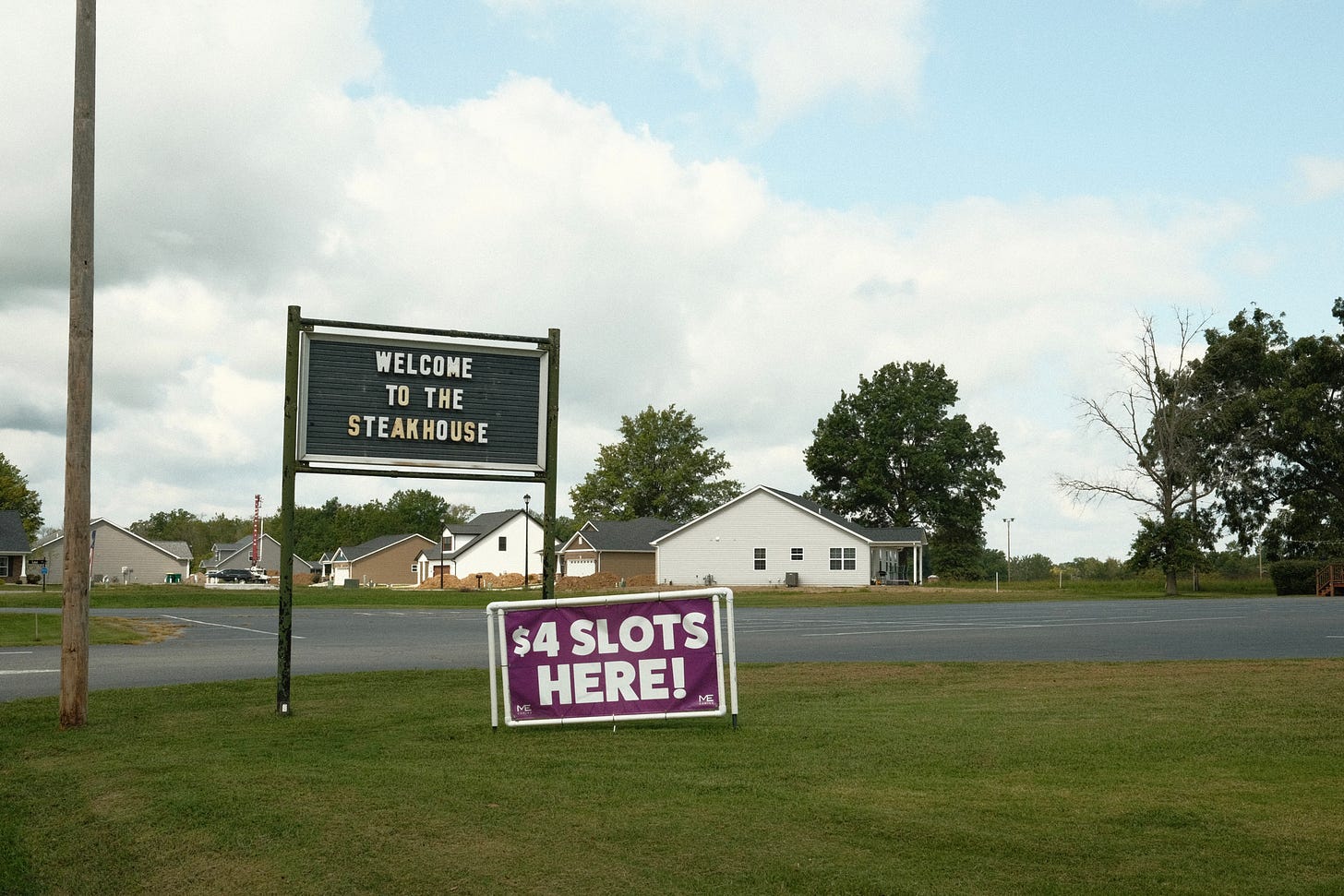Know When to Fold ‘em
Gambling, hustle culture, and the ads during sports broadcasts
The first time I went to Las Vegas, I was twenty, on a trip to a convention for my college’s broadcast news club. The city’s famous sins were legally unavailable to me, but ubiquitously offered and indiscriminately targeted—slot machines at the airport gate, waitresses with trays of free cocktails, and sidewalks lined with discarded flyers for strip shows.
Because gambling was at a legal and geographic remove (and because Las Vegas tourism marketing was effective) it retained a reputation in my mind as the most elusive and therefore most indulgent of the vices. Bars and strip clubs are everywhere; gambling took a vacation.
The gambling that was available to me—the lottery—had an air of either desperation or hopeful frivolity. I knew of people spending paychecks on gas station scratchers and I knew of office Powerball pools where buyers-in dreamt of making enough to leave the office for good. Both were fantasies.
Twenty years later, the fantasy is everywhere. The Supreme Court threw out the federal ban on sports gambling in 2018, giving states a new taxable revenue stream and sports books a high-tech opportunity. Billboards for sports betting apps line highways the way strip club fliers covered Las Vegas sidewalks. Fast-talking hosts pitch apps on podcasts, running through lengthy legally required disclaimers about risk and addiction. Ads are especially prevalent on TV during sports. Essentially every ad break in a football game features at least one spot for a sports betting app, usually with a celebrity spokesperson. In what would otherwise be editorial, gambling is an area of coverage. Analysis shows have segments sponsored by DraftKings or their competitors and pundits frame games according to betting odds.
Gambling has become the default second-screen experience.
Besides betting apps, the other major advertisers are pharmaceutical companies and insurance. Taken in constant, large doses, the message to millions of Americans delivered in every broadcast is plain: you’re sick, you’re in danger, you can get rich.
Betting isn’t just augmenting sports. The casino is everywhere. Prediction markets like Kalshi let users bet on political outcomes. Some pundits and politicians treat these bets as if they’re public opinion polls.
At first, the rise of gambling seems like a new level of fandom—if you like something, put your money into it. But I don’t think that’s the case. Few of the sports fans I know place bets—they avoid the temptation and ignore the ads. The political junkies I know despise the prediction markets. When I talked over the idea for this piece with Arielle, she mentioned how it seems like gambling has become the latest evolution of hustle culture. (Something we’ll discuss on an upcoming podcast.)
Gambling has become another way to use your phone to fill all your idle time chasing money. But the reality of the odds makes betting like a stationary version of working in the gig economy—the same low wages and climbing personal expense of driving rideshare or making deliveries. The fantasy also elides the fact that gambling on sports with any consistent success requires skill—one that takes a lot of study to hone, and even then is imperfect in the face of luck. I lived in Kentucky for years and developed an appreciation for horse race betting, which I was always terrible at and too impatient to learn to do. Everyone is able to gamble, few actually can. Our digital technology works against the careful contemplation required to do it right. People still do it, though. And they do it a lot. Reportedly, searches for gambling addiction help are on the rise.
Hustle culture, as it’s often described, doesn’t just imply that hard work will help you make a living. In its high-tech application, the idea is that constantly working will make you very rich, until you have the money to earn passive income and can stop hustling forever. Until then, if you’re not earning money, you’re wasting time. It’s not just sports shows—so much media thrives on this illusion. Streaming services let musicians upload their tracks with the implication that they may be the next great hitmaker. Social media sites suggest virality is one post away. Fan sites monetize your nudes. At first, all these seemed like democracy—ways of getting around the old guard gatekeepers. Now they seem like bosses. It takes millions of streams to make what a musician might’ve earned in a set at a local bar. Virality fades fast. Chasing money is chasing an algorithm’s favor. The outcome of a sporting even may be a little less random, but it’s no more controllable.
The advantage of betting is that at least it’s private. There’s no need to open yourself to the world to do it, no rude comments or down trend lines on the in-app analytics. There’s no bumping into an ex when you drop off a burrito bowl.
We all know the cliche of the middle-aged man at the sports bar saying he could’ve gone pro. Now he can sit at home and imagine he’s an expert analyst. No one can see the love handles, no one can doubt him. What happens on his phone stays there.




Your comment about political types relying on the betting markets... gosh, I really lost a lot respect for a writer/podcaster whose name rhymes with Sate Nilver after his *constant* references to those markets ahead of the last Presidential election. Know the dude's in deep when it comes to gambling, but it felt especially gross, somehow. // This is a good read. Always enjoy seeing T/A in my inbox.